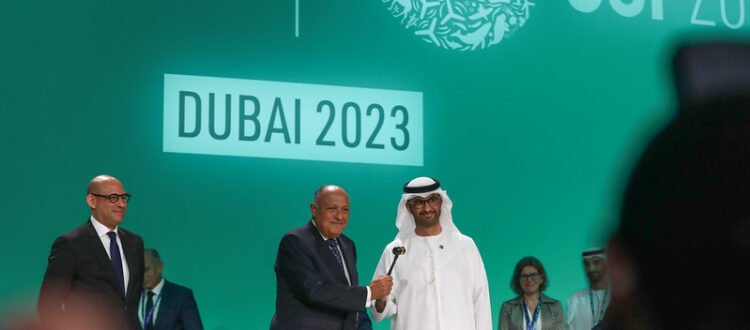LOSS AND DAMAGE, FLASH APPROVAL
COP28 started with the foot on the accelerator. The will of the UAE presidency to dispel as much as possible any doubts and suspects regarding this first COP chaired by a CEO of an oil company was evident in the time that elapsed between the handover between the Egyptian Shoukry and the Emirati Al Jaber – Presidents of COP27 and COP28 respectively, who participated together in the opening plenary on Thursday, November 30th– and the first decision taken.
A connection that is not only visual and symbolic, the one between the two COPs, but also political, given that the new Presidency immediately sought an important result on what had been the theme of 2022: the new Fund to compensate Loss and Damage. It was expected that during this COP the delegates would discuss the work carried out in recent months by the Transitional Committee which was responsible for outlining a draft regulation of the new fund. If anything, we wondered whether the delegates would have risked extending the time by reopening a text that was now locked down for many – but which almost no one had liked, starting from the doubts about the World Bank as a host and legitimate questions about respect for human rights – or whether instead they would go straight for the full package, “take it or leave it”.
Less than three hours after the start of the activities, it was understood that the Presidency had already carried out – with insight, evidently – the necessary political steps to quickly arrive at the result and that the draft would be approved, so much that on Wednesday evening a draft decision in this sense appeared among the UNFCCC documents, at point 8.g of the agenda. Here, therefore, as the first act of this strange and unusual oil COP we see the much-desired launch of the Loss and Damage Fund, compensating for losses and damages in the most fragile countries, through the approval of the decision in the first plenary session. Quite an unusual scenario for a COP, where important decisions are usually chewed, digested and rehashed for days on end. An entirely political leap forward, well managed by the Emirates in their desire to give speed and assessment to the process, which however leaves speechless those hoping for at least a partial revision of that text.
As the Italian Climate Network, we launched a campaign at the end of the summer (#SottoiNostriOcchi), which was joined by influencers, activists and local authorities, to ask the Governments worldwide, and in particular the Italian one, to contribute to the effective launch of the Fund as part of the European delegation and possibly to subsidize as Italy with an initial start-up contribution. On Thursday the European delegation in Dubai actually announced European financing of the fund – already announced a few days ago by European Commissioner Hoekstra – in the amount of 225 million euros, of which over 100 from Germany alone (which last year, however, had announced through its international cooperation a contribution of 170 million euros for the “rival” Global Shield, a system based on insurance schemes and not on payouts) and approximately 23 million euros from Denmark. Similarly, the United Arab Emirates announced an initial contribution of $100 million, the United Kingdom $75 million and Japan $10 million. Almost last, in this initial and certainly preliminary ranking, are the major historical sources of global emissions, the United States, which showed up in Dubai with a poor contribution (compared to what was ethically expected) of 17.5 million dollars. Yet another US financial disengagement, although not total in this case, from its historical responsibilities in terms of emissions is perhaps the biggest frictional note at the start of COP28 – it should be noted, however, that less than a month ago the United States itself had decided to dispute the consensus on the text reached in the Transitional Committee, something not reiterated on the first day of negotiations.
What about Italy? To date there are no precise indications regarding the role played by our Country within the European delegation towards supporting today’s decision, just as there are no certainties regarding the Italian financial commitment to the new Fund, but we imagine it is present in any case. It is important to point out in this sense that the path to the new Fund was also open by our Government a few days ago, understandable from the Agenda approved (by the majority) last November 28th in the Chamber of Deputies, which invited the Government to contribute. The text approved by the government parties came after the presentation of a text on the same topic presented by the Democratic Party, which instead asked to commit Palazzo Chigi towards an initial contribution of 100 million euros in the new Fund, a figure which later disappeared from the actually approved text.
We must now carefully follow the speech of Prime Minister Meloni on the leaders’ day, from which we may perhaps have news regarding the Italian contribution to the Fund and, at the same time, an awaited update regarding the Italian Climate Fund, which was ultimately not transferred to the Piano Mattei but still not active today, despite the double launch in 2021 and then at COP27 last year.
Article by Jacopo Bencini, Policy Advisor, European and Multilateral Climate Policies Italian Climate Network
Cover photo credits: UNFCCC

